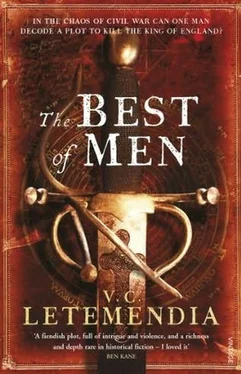Claire Letemendia - The Best of Men
Здесь есть возможность читать онлайн «Claire Letemendia - The Best of Men» весь текст электронной книги совершенно бесплатно (целиком полную версию без сокращений). В некоторых случаях можно слушать аудио, скачать через торрент в формате fb2 и присутствует краткое содержание. Год выпуска: 2009, ISBN: 2009, Издательство: McClelland & Stewart, Жанр: Исторические приключения, на английском языке. Описание произведения, (предисловие) а так же отзывы посетителей доступны на портале библиотеки ЛибКат.
- Название:The Best of Men
- Автор:
- Издательство:McClelland & Stewart
- Жанр:
- Год:2009
- ISBN:978-0-7710-5274-3
- Рейтинг книги:5 / 5. Голосов: 1
-
Избранное:Добавить в избранное
- Отзывы:
-
Ваша оценка:
- 100
- 1
- 2
- 3
- 4
- 5
The Best of Men: краткое содержание, описание и аннотация
Предлагаем к чтению аннотацию, описание, краткое содержание или предисловие (зависит от того, что написал сам автор книги «The Best of Men»). Если вы не нашли необходимую информацию о книге — напишите в комментариях, мы постараемся отыскать её.
The Best of Men — читать онлайн бесплатно полную книгу (весь текст) целиком
Ниже представлен текст книги, разбитый по страницам. Система сохранения места последней прочитанной страницы, позволяет с удобством читать онлайн бесплатно книгу «The Best of Men», без необходимости каждый раз заново искать на чём Вы остановились. Поставьте закладку, и сможете в любой момент перейти на страницу, на которой закончили чтение.
Интервал:
Закладка:
She dropped Laurence’s hands and leant forward to murmur in his ear. “You must go home.”
“Why?” he whispered, his voice as tremulous as the rest of him.
“That is for you to learn.” She slipped from her arm a thin leather bracelet, which seemed to contain something stitched inside. “Here — it will protect you on the journey, and remove the worst of the poison,” she said, looping it about his scarred wrist. “Wear it until it falls off of its own accord.” As she fastened it, uttering words in another, incomprehensible language, he felt every nerve in his body tense and he could not avert his gaze from hers. Then she ran her hands over his face, as if to release him from her spell, and smiled sadly.
He bowed his head, trying to comprehend what had passed through him, and when he looked up, he was half relieved to see that she had vanished.
Yusuf was refilling the pipe. Apparently oblivious to his guest’s unease, he started to talk about the many ports he had visited, and the many occasions that he had braved death when his ships had been overrun by pirates, or swept into storms or wrecked on hostile shores; and he spoke of his love for the ocean, as whimsical a mistress as the goddess Fortune herself. “There is no life without her,” he concluded, “and maybe one day I shall set sail for a last time.” He fell silent, regarding Laurence with his dark, hooded eyes, before asking, “Which course will you choose tomorrow?”
“I don’t know,” Laurence said. “I honestly don’t know.”
“Not so,” Yusuf told him quietly. “In your heart, you have already decided.”
Part One
England, July-August 1642
CHAPTER ONE
I
“How is it for you, Beaumont, to be in England again?” Ingram asked.
Beaumont glanced around as if he might find an answer somewhere in the dank atmosphere of the taproom. “Strange,” he replied.
“Well, you look much the same,” Ingram said, although this was not completely true.
“But look at you , Ingram. You’ve lost some hair.
“Ingram ran a hand over his scalp. “Kind of you to mention it.” Beaumont, he observed, had not lost any of his hair, which was as black as ever, wavy and unkempt, tied back with a piece of string. As always, he appeared conspicuously foreign beside his fellow countrymen with their red and pink complexions, even when he was not burned to his present dark brown by a harsher sun than theirs; indeed, his colouring had earned him the derogatory Latin nickname of Niger when they were at university together. He still possessed his attitude of relaxed grace, leaning back against the wall so that he did not have to sit up straight on the wooden bench. He was clean-shaven, though not very well, and not very recently. He wore no jewellery save the plain gold earring that had a special significance for Ingram: on the night Beaumont had got his ear pierced, he himself had lost his virginity at an Oxford brothel. While waiting for him, Beaumont had submitted to this small operation, performed by his favourite girl. When she wanted to give Ingram the same treatment, he had refused, blushing after what he had just done, and anxious to return to the safety of their college.
It amused him to see that Beaumont’s clothes were in typical disarray: his collar was missing, the front of his shirt hung open, and his doublet lacked most of its buttons. Apart from his shirt, which seemed reasonably fresh, everything was stained and torn. His dishevelled state could not be taken as an indication of his material circumstances. Ingram had known him to have his pockets full of money and be no better dressed.
Yet he had changed, Ingram thought. Though lanky as ever, he was broader in the shoulders: life in the army must have forced him into some more strenuous physical activities than drinking and bedding women. The shadowy skin around his pale green eyes had deepened in hue. His face was thinner, the lines on either side of his mouth now more pronounced, as were his high cheekbones, and he had acquired a small scar across his lower lip on the left side. His expression was not quite so mischievous as Ingram remembered; perhaps he even had a guarded look about him.
“You hardly acquired that blackamoor colour fighting in the Low Countries,” Ingram remarked.
“I was in Spain for the last two or three months.”
“In Spain! To see your mother’s family?”
“No.”
“Why, then?” Beaumont shifted in his seat. “Let me guess,” Ingram said. “It was for a woman. Am I right?”
“Yes.”
“Were you in love?” Beaumont squinted at him. “Tell me about her. Was she some Spanish duchess bored by an inattentive husband? A courtesan more skilled in the arts of seduction than you?”
“Enough, Ingram.”
“It ended badly, I assume.”
“Very badly.”
“I’m sorry. Did you sail here straight from Spain?”
“No, I flew,” said Beaumont sarcastically. “Let’s get some more wine.”
He gestured at the serving woman, who approached at once with a new jug. He asked her name, at which she blushed and answered, giggling, and hovered by their table until summoned by another drinker.
“Ever prodigal with your charm, aren’t you,” Ingram commented, when she had gone.
“It doesn’t cost anything to be pleasant.”
“Speaking of pleasant, this is the lowest tavern in Newbury. I wouldn’t have set foot in it if you hadn’t insisted. Why didn’t you come to my brother’s house, half a mile off? We serve much better wine.”
“I’m sure you do,” said Beaumont, availing himself of the inferior liquid, “but I didn’t think Richard would be happy to see me. And I like low taverns.”
“As well I recall. Oh, Beaumont, I’m overjoyed to see you. I kept wondering if you were alive, hoping you were.”
Beaumont responded with one of the beautiful flashing smiles that Ingram had never managed to resist no matter how much his friend might irritate him, and reached out to pat Ingram’s hand. As he did so, Ingram saw that he bore another much longer scar on the underside of his left wrist, a jagged white line that contrasted painfully with the skin around it and ran from some point hidden beneath his sleeve all the way down to the base of his thumb. About the same wrist was tied a curious leather band that he now pushed back beneath his sleeve as though he did not want Ingram to notice it.
“How did you get the scar?” Ingram asked.
“A game of cards,” he said, dismissively.
“Still playing the tables, are you?”
“If the need arises.”
They were silent for a while; then Ingram said, “I’m glad you caught me when you did. I was about to leave for Oxford to join my troop.”
“Your troop ?”
“I know — you’d think I’d be the last man to take up arms. But then you weren’t exactly full of martial spirit six years ago.”
“I wasn’t, and I’m still not,” Beaumont said, with a laugh.
“We may have no choice in the matter soon,” Ingram said, lowering his voice. “War is very likely.”
“What brought it all about, Ingram — politics or religion?” Beaumont inquired, pouring for them both.
Ingram sighed and considered. “As much the one as the other, I’d say. Parliament had its grievances over the King levying taxes without its consent, and imposing his prayer book, here and in Scotland. But there’s been rioting everywhere. You may not have heard yet — Parliament has accused His Majesty of being seduced by evil counsellors, Lord Digby above all, and Queen Henrietta Maria herself. Can you imagine — the radicals in the House of Commons were threatening to impeach her, to bring her to trial! They believed she was scheming to import Catholic troops from Ireland to stamp out the dissent in London. His Majesty had to send her to The Hague, they were both in such fear of her life. Hard to believe their own subjects would show such disrespect for her — and for a king who ruled in peace for so many years.”
Читать дальшеИнтервал:
Закладка:
Похожие книги на «The Best of Men»
Представляем Вашему вниманию похожие книги на «The Best of Men» списком для выбора. Мы отобрали схожую по названию и смыслу литературу в надежде предоставить читателям больше вариантов отыскать новые, интересные, ещё непрочитанные произведения.
Обсуждение, отзывы о книге «The Best of Men» и просто собственные мнения читателей. Оставьте ваши комментарии, напишите, что Вы думаете о произведении, его смысле или главных героях. Укажите что конкретно понравилось, а что нет, и почему Вы так считаете.












